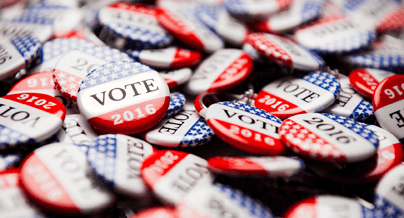
Poll: Bankers Sound Off on Election
 A majority of bankers believe that Republican presidential candidate Donald Trump will have a more positive impact on the nation’s economy than Democratic nominee Hillary Clinton if he’s elected to the Oval Office on November 8, although many professional economists disagree. And he’s probably got their vote, too, according to Bank Director’s 2017 Bank M&A Survey, sponsored by Crowe Horwath LLP. However, fewer say they support Trump, compared to bankers who said they’d vote for Mitt Romney in 2012.
A majority of bankers believe that Republican presidential candidate Donald Trump will have a more positive impact on the nation’s economy than Democratic nominee Hillary Clinton if he’s elected to the Oval Office on November 8, although many professional economists disagree. And he’s probably got their vote, too, according to Bank Director’s 2017 Bank M&A Survey, sponsored by Crowe Horwath LLP. However, fewer say they support Trump, compared to bankers who said they’d vote for Mitt Romney in 2012.
- Fifty-five (55) percent believe that a Trump presidency would be best for the United States economy.
- Fifty-eight (58) percent plan to vote for Trump, compared to 10 percent for Clinton. Twenty-one percent are unsure which candidate, if any, has their vote.
- Sixty-six (66) percent believe that Trump is more likely to reduce the industry’s regulatory burden.
More than 200 bank executives and directors participated in the survey. Bank Director’s survey was conducted in September, before the debates took place and allegations of sexual assault surfaced against Trump. During the survey period, Real Clear Politics, which aggregates poll averages across the country, had Clinton polling ahead of Trump by 0.9 to 3.9 percent. The news outlet predicts a Clinton victory at this time.
Economists are not all in agreement about the impact that a Trump presidency would have on the U.S. economy, in part due to his ideas on taxes and trade. Several have predicted a dire outcome if Trump prevails on Election Day. The advisory firm Oxford Economics, based in Oxford, England, predicted in September that the economic policies outlined by Trump could shrink the U.S. economy by $1 trillion by 2021. The rating agency Moody’s Analytics stated in June that a Trump administration will isolate the U.S. economy, incur more government debt and result in the loss of 3.5 million jobs. A month later Moody’s predicted that Clinton’s economic policies would “result in a somewhat stronger U.S. economy.”
In contrast, David Woo, head of global interest rates and currencies research at Bank of America, told Bloomberg in September that in a Trump presidency “the U.S. economy would probably take off in a big way,” due to the candidate’s proposed fiscal policies, including extensive spending on infrastructure and tax cuts.
Richard Hunt of the Consumer Bankers Association says bankers don’t put a lot of faith in these sorts of wonkish pronouncements. Bankers see an experienced CEO in Trump, not a career-long politician like Clinton. “[Clinton would be] a continuation of [President] Obama’s policies, and a lot of bankers are frustrated,” says Hunt. The CBA doesn’t endorse a specific candidate for the nation’s top office.
Trump’s statements indicate a consistent distaste for regulation. “Dodd-Frank has to be either eliminated or changed greatly,” Trump told CNBC in May 2016. “The regulators are running the banks.”
Clinton plans to defend the Dodd-Frank Act. Her campaign also advocates new reforms for the financial sector, including a so-called “risk fee” for big banks that would scale higher for banks with larger amounts of and riskier forms of debt, compensation rules to curb risky behavior and a strengthened Volcker rule. Breaking up big banks is also on the table.
Bankers aren’t as in love with Trump as with past Republican nominees. In a survey conducted in advance of the 2012 election, Bank Director found that 79 percent supported Mitt Romney, compared to 8 percent for President Obama and 13 percent undecided. Support for Romney was 21 points higher than for Trump. It’s not that Clinton is seeing significantly more support—more bank executives and board members are unsure of whom to support, if anyone, compared to four years ago.
In a recent twist for the industry, this year’s election could be crucial to the future of the Consumer Financial Protection Bureau. On October 11, a federal appeals court found the bureau’s structure to be unconstitutional, and ruled that its directorship should fall under the control of the president, a decision that could be appealed by the Obama administration. If that decision isn’t overturned, it’s likely that a Clinton presidency would strengthen the agency. A Trump administration is likely to weaken the CFPB.
“It has to be Trump,” says Blair Hillyer, the chief executive officer at First National Bank of Dennison, a $221 million asset community bank in Dennison, Ohio. He’s a lifetime Republican that isn’t thrilled with either candidate, but he believes that Dodd-Frank has been too damaging to the industry. Under Hillary Clinton, “the regulation would continue, and we’ll continue to lose community banks,” he says.
The complete results of the 2017 Bank M&A Survey will be available on BankDirector.com in November.



